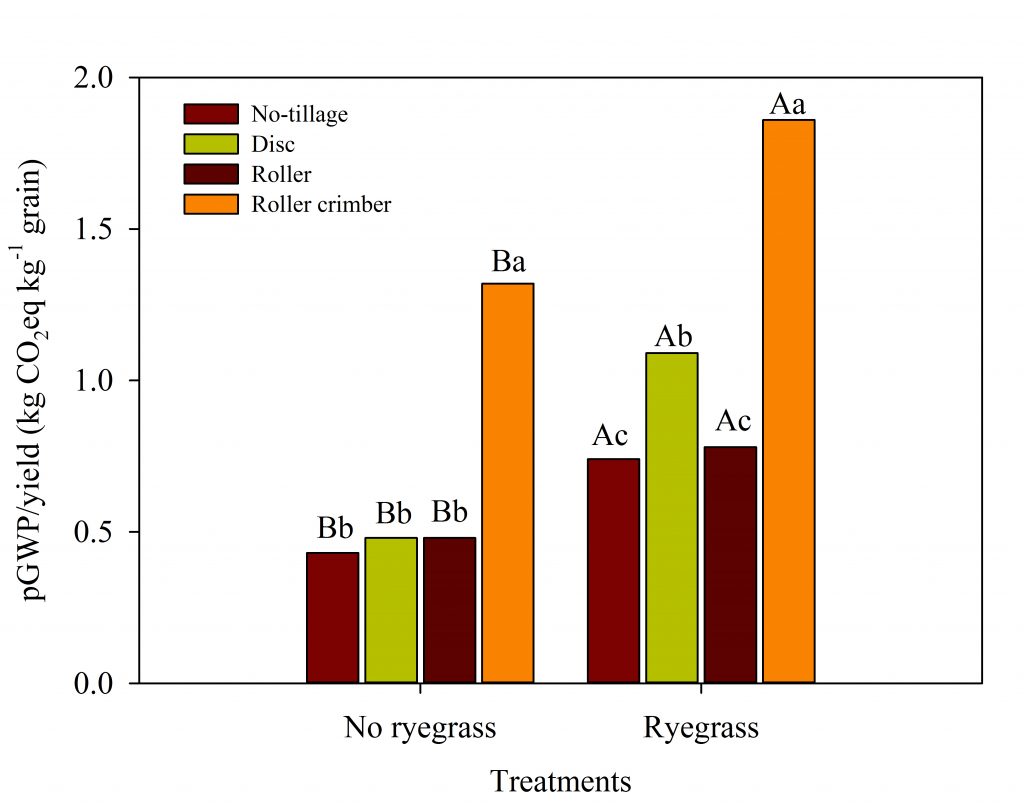Straw management effects on global warming potential and yield-scaled greenhouse gas emissions in a subtropical rice ecosystem
23/May/2023
ABSTRACT Global warming potential (GWP) of rice paddies depends on straw management. This study evaluated methane (CH4) and nitrous oxide (N2O) emissions and soil C stocks to determine GWP and yield-scaled GWP under different strategies and intensities of rice straw management in a subtropical climate. We hypothesized that decreasing soil management intensity and straw incorporation in the soil would reduce GWP. Methane fluxes were substantially higher during the rice growing season than in the off-season, while the opposite was observed […]
Mitigation of greenhouse gases emission affected by no-tillage and winter cover crops in a subtropical paddy rice ecosystem
06/Apr/2023
ABSTRACT Paddy rice production based on traditional soil management emits large amounts of methane (CH4) into the atmosphere. This study assessed the potential of no-tillage (NT) and winter cover crops (WCC) to mitigate net greenhouse gas (GHG) emissions in a subtropical paddy rice ecosystem. A long-term (20-yrs) experiment was evaluated regarding the effect of NT combined with winter fallow or three WCC (ryegrass, white oat, and birdsfoot trefoil) on seasonal CH4 -C and nitrous oxide (N2O-N) emissions and on soil […]
Greenhouse gas emissions during rice crop year affected by management of rice straw and ryegrass
03/Aug/2020
ABSTRACT One of the challenges in rice areas is the sustainable post-harvest system, which involves using rice straw management and cover crop species. In this context, this study aimed to evaluate the emission of methane (CH4) and nitrous oxide (N2O) with the use of different post-harvest management of rice straw as well as with the combined use of ryegrass. A field experiment was conducted during the 2016 off-season and 2016/17 rice crop season with different post-harvest rice straw management: maintaining […]
Soil CH4 and N2O Emissions from Rice Paddy Fields in Southern Brazil as Affected by Crop Management Levels: a Three-Year Field Study
20/Apr/2018
ABSTRACT Rice yield increases in response to improvements in crop management, but the impact on greenhouse gas (GHG) emissions in the subtropical region of Southern Brazil remains unknown. A three-year field study was developed aiming to evaluate the impact that an increase in crop management levels (high and very high) has on soil methane (CH4) and nitrous oxide (N2O) emissions, as compared to the level (medium) currently adopted by farmers in Southern Brazil. Differences in crop management included seed and […]
Greenhouse gas emission caused by different land-uses in brazilian Savannah
01/Feb/2011
The conversion of native forests by cutting and burning into farming areas leads to alterations in the dynamics of soil organic matter, with changes in emissions of greenhouse gases (GHGs: CO2, CH4 and N2O) from the biosphere to the atmosphere. These cause an average temperature rise and, consequently, global climate change. The aim of this study was to examine relationships between the fluxes of CO2, CH4 and N2O with moisture, microbial biomass and inorganic N forms in soil with different […]
CO2, CH4 and N2O fluxes in an Ultisol treated with sewage sludge and cultivated with castor bean
01/Dec/2009
Organic residue application into soil alter the emission of gases to atmosphere and CO2, CH4, N2O may contribute to increase the greenhouse effect. This experiment was carried out in a restoration area on a dystrophic Ultisol (PVAd) to quantify greenhouse gas (GHG) emissions from soil under castor bean cultivation, treated with sewage sludge (SS) or mineral fertilizer. The following treatments were tested: control without N; FertMin = mineral fertilizer; SS5 = 5 t ha-1 SS (37.5 kg ha-1 N); SS10 […]

